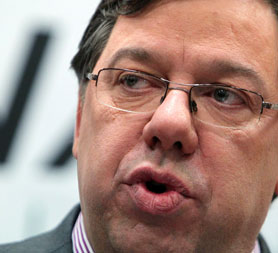Brian Cowen retains control of ruling Fianna Fail party
Despite Irish Prime Minister Brian Cowen surviving a leadership battle, he looks certain to lose the ballot when he faces the electorate later this year, writes Ireland expert Dr Peter Stafford.

Having survived a leadership bid from his foreign affairs minister, Brian Cowen now goes on to face the electorate in a March General Election which he is certain to lose. Like all leaders entering their final days in office, Brian Cowen’s mind must certainly be turning to the fight ahead, and then to his legacy.
Until recently, Cowen had very few reasons to fear the electorate – he was the architect and engineer of Europe’s fastest and most dynamic economy. He was the unopposed leader of Ireland’s largest and most successful political party. His Cabinet was united, his opponents were grudgingly supportive and even the distractions in Northern Ireland were gone. Now he sits alone – his Cabinet openly hostile, his sparse and miserable grassroots supporters in negative equity and his paymasters in the IMF monitoring his every expense.
Bertie’s part
Brian Cowen must curse Bertie Ahern, who in 2008 walked out of Government Buildings and into some lucrative writing gigs. It was Bertie who was invited to give addresses to the joint Houses of Parliament and a joint session of Congress and Senate as the peacemaking hero of the Irish. It was Bertie who is remembered as the little terrier from the working class Dublin neighbourhood who ended up running the country and bringing peace to Ireland. And, sure, if a bit of money ended up in his pocket, there was plenty to go around.
Cowen might well have anticipated that he would receive a similarly benign place in history. And, had it not been for the banks, the developers and the economic bubble which he made, it might well have happened.
Many people in Ireland claimed credit for creating the Celtic Tiger, but Brian Cowen was there through it all. Becoming Minister for Finance in 2004, he inherited as good an economy as a minister can hope for.
Apart from a few begrudging economists, the bulk of the electorate Cowen will face in March were happy, living in a country of full-employment, rising house prices and easy credit.
Even Ireland’s roads – once the butt of many jokes – were given a make-over firstly thanks to the EU and then thanks to annual budgetary surpluses. During his period in government, Ireland quietly moved from being a net recipient from Europe to a net contributor and Ireland slowly surpassed Robert Emmett’s dying ambition of taking its place amongst not only the nations of the world, but becoming one of the wealthiest nations of the world.
The wealth, in retrospect, was truly staggering. The displays of wealth more so.
Businessmen could easily and seamlessly move from a breakfast briefing in the glass and steel headquarters of an American bank to lunch with a couple of junior ministers in a country house hotel, to dinner with a billionaire property developer in a private suite at the Four Seasons. Then in the back bar of Doheny and Nesbitt’s pub, they could swill it all down with €5 pints of Guinness and pat themselves on the back. And they did.
Anglo-Irish
The boundaries between the banks, the developers and the government blurred, as money moved and grew. Lending restrictions were loosened, prices increased and the economy threatened to overheat.
Like many political leaders before him, Cowen will not be brought down by the big issues – the IMF bailout, the billions of euro black hole in the banks or the collapse of the housing market.
Rather, it will be a round of golf with Sean Fitzpatrick, chairman of Anglo-Irish Bank in the months before the Government guarantee of Anglo bank which has crystallised Cowen’s failures amongst both his political opponents and his backbench colleagues.
Things have changed rapidly since the days of the Celtic Tiger, and Cowen’s legacy is now irrevocably tied to Ireland in early 2011 than Ireland in mid 2006. Yeats, standing in the rubble of Dublin in 1916 noted that everything had changed, changed utterly – a terrible beauty, he wrote, was born.
In the rubble of the Celtic Tiger, the terrible beauty of change is everywhere. Everyone in Ireland knows someone in their early thirties who, seeing no hope in Ireland, is now working in Canada or Australia. Everyone thinks they know someone who is hanging onto their home only because of low interest rates and their credit card. Everyone knows someone in their mid-forties who has been made redundant and who is never likely to work again.
By good fortune and subtle re-writing of history, Bertie Ahern will take credit for the glass and steel, designer labels and expensive lunches. It will be Cowen who – having survived his party colleagues – will be forced to sell the rubble of the economy he built to a dazed and depressed electorate. He may, in these dying days of his premiership, wonder if it hadn’t been easier to lose tonight.
Dr Peter Stafford, is an economic and business researcher based in Dublin, Ireland.
-
Latest news
-
India’s ‘YouTube election’: Influencers enlisted to mobilise youth vote6m

-
Putin denies plans to capture Ukrainian city of Kharkiv3m

-
Plaid Cymru ends co-operation agreement with Welsh Labour government4m

-
Infected blood scandal: Government was warned years before taking action6m

-
Displaced in Gaza have to ‘start from Zero’ many times over, says Gaza NGO director3m

-




